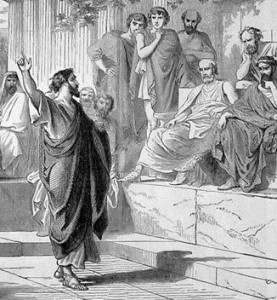Paul’s Thorn – An Appraisal of 1st Corinthians 12
June 19, 2014Sometimes debated but most times conceded, the thorn in Paul’s flesh, as taught by many in the American church, has become a bit of a “sore spot” for those who wish to throw off the baggage of biblical half-truths. In this blog, we’ll pick 1st Corinthians 12 apart, along with some other scriptures, in an effort to arrive at God’s truth in the matter.

“I must go on boasting. Although there is nothing to be gained, I will go on to visions and revelations from the Lord.2 I know a man in Christ who fourteen years ago was caught up to the third heaven. Whether it was in the body or out of the body I do not know—God knows.3 And I know that this man—whether in the body or apart from the body I do not know, but God knows—4 was caught up to paradise and heard inexpressible things, things that no one is permitted to tell.5 I will boast about a man like that, but I will not boast about myself, except about my weaknesses.6 Even if I should choose to boast, I would not be a fool, because I would be speaking the truth. But I refrain, so no one will think more of me than is warranted by what I do or say,7 or because of these surpassingly great revelations. Therefore, in order to keep me from becoming conceited, I was given a thorn in my flesh, a messenger of Satan, to torment me.8 Three times I pleaded with the Lord to take it away from me.9 But he said to me, “My grace is sufficient for you, for my power is made perfect in weakness.” Therefore I will boast all the more gladly about my weaknesses, so that Christ’s power may rest on me.10 That is why, for Christ’s sake, I delight in weaknesses, in insults, in hardships, in persecutions, in difficulties. For when I am weak, then I am strong.”
2nd Corinthians 12
What Tradition has taught us
I’ve heard everything but the theological kitchen sink from tradition-minded leaders on Paul’s thorn, some of which are extremely abstract and ridiculous (one of these being that Paul suffered frequently with bouts of epilepsy – yet history and 13 epistles provide no evidence to this point). ~The conventional teaching in the church is that the thorn given to Paul was a disease or sickness to hinder his ministry. Oftentimes this view is even reinforced by Galatians 4:13, which deduces that an infirmity in the flesh affected Paul at the time he authored Galatians as well, which is a completely insufficient comparison (an independent word study would show you that “infirmity” refers more nearly to Paul’s lack of strength or confidence here). Unfortunately, I think we’ve been dealt a misleading hand from tradition on this topic!
Important Contextual Clues
What typically accompanies heightened spiritual senses, and in Paul’s case, increased revelation and visions? A counterattack from the enemy! It’s vintage spiritual warfare. We deal with it every day, especially if we’re following Him closely, and Paul was no different. These attacks can range from discouragement to depression to feelings of abandonment, stress or fear. These intangible flaming arrows hurled by the enemy are designed to keep us from our commission and purpose. In Paul’s case, he actually explains these and lists examples of them in relation to his thorn. See the below contextual clues:
1. Verse 7 – The thorn was a messenger of Satan, clearly stated. Throughout the Bible, in both Greek and Hebrew, messenger and angel (angelos and malach) have been used interchangeably. This should point to the realization that Paul was referring to an angel or messenger of Satan that was irritating him with any and all of the nuisances mentioned in the text. The messenger, weighing its motives against both the bible and logic, would not be a herald of physical disease or sickness because A: a messenger usually has something to say (i.e undermining one’s worth, discouraging, etc.) and B: other instances in Paul’s related texts point to the same non-carnal harassment from Satan’s league of persecutors. (Acts 13:45, Acts 14:5-7, 11 Corinthians 11:24-26). So, context clues point to this thorn being of spiritual influence and not one of physical influence.
2. Verse 10: Paul summarizes his thorn, delighting in the weakness of having to endure insults, hardships, persecutions and difficulties. These are all non-physical challenges, but rather circumstantial ones.
3. II Corinthians 11:26 – Paul precedes his thorn in the flesh remark with actual examples of these attacks in II Corinthians 11. (i.e. whipped, beaten, shipwrecked, faced with danger). Keep in mind, the plots against Paul that did result in him being physically hurt were spiritual mindsets which influenced those who would go on to harm Paul, and thus the physical act was secondary to the motive. With this in mind, physical infirmity or sickness is far from the topic at hand when recounting these attacks on Paul.

So what’s the flesh, contextually?
If we’re considering the 2nd Corinthians text in succession, we’ve just read an entire book (Romans) centered in the spirit/flesh dynamic, where Paul is describing the flesh not just as your skin, but more generally as a dead mindset or way of living. –Romans 8- Yet traditional doctrine abandons this truth and in its short-sightedness dismisses its key lesson in spiritual warfare and, apparently, holds sickness in high regard. Just as this thorn was purposed to irritate and discourage through spiritual means, Paul, at war with the flesh as Romans details, could have entertained these attacks and thus let his flesh rule (not letting the flesh rule was in many ways the backbone of the book of Romans). Agreeing with an attack with the intent to discourage, and in effect becoming discouraged would have been a classic Flesh: 1- Spirit- 0 scenario. In summation, Paul’s war with the flesh in Romans was perpetuated in II Corinthians, as Satan attempted to leverage Paul’s old nature and lure him into discouragement and fear with this nagging thorn.
A Cessationist Stronghold
The proposal that Paul’s thorn was a disease or other physical ailment is often submitted by those who hold to the doctrine that instances of physical healing are reserved only for the day of complete atonement, a very cessationist view indeed. Discounting current day maneuvers of the Spirit like healing or prophecy would be a convenient viewpoint for someone looking to justify this particular angle in the scripture. It would be disheartening if this were indeed the motive of some, but motives aside, this doctrine has several holes and it simply doesn’t line up. Unfortunately, it supports the school of thought that a physical ailment did plague Paul for the majority of his ministry, and permitting this idea is dangerous and has the ability to dull and dilute the power of the Spirit, which is something we cannot afford in today’s church.
“The Kingdom of God is not only a matter of word, but of power.”
1st Corinthians 4:20
It’s always critical to consider scripture in context and in succession to fully grasp its meaning and power. Don’t misunderstand me, scripture was not breathed into being through divine inspiration with the intent of fooling us, but it does require a little bit of critical thinking on our end!
Joe D’Orsie – Communications & Spiritual Life Counsel